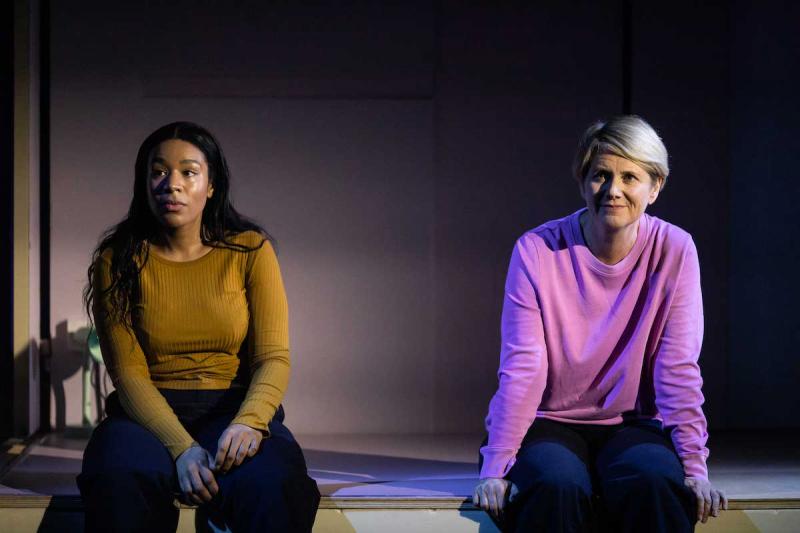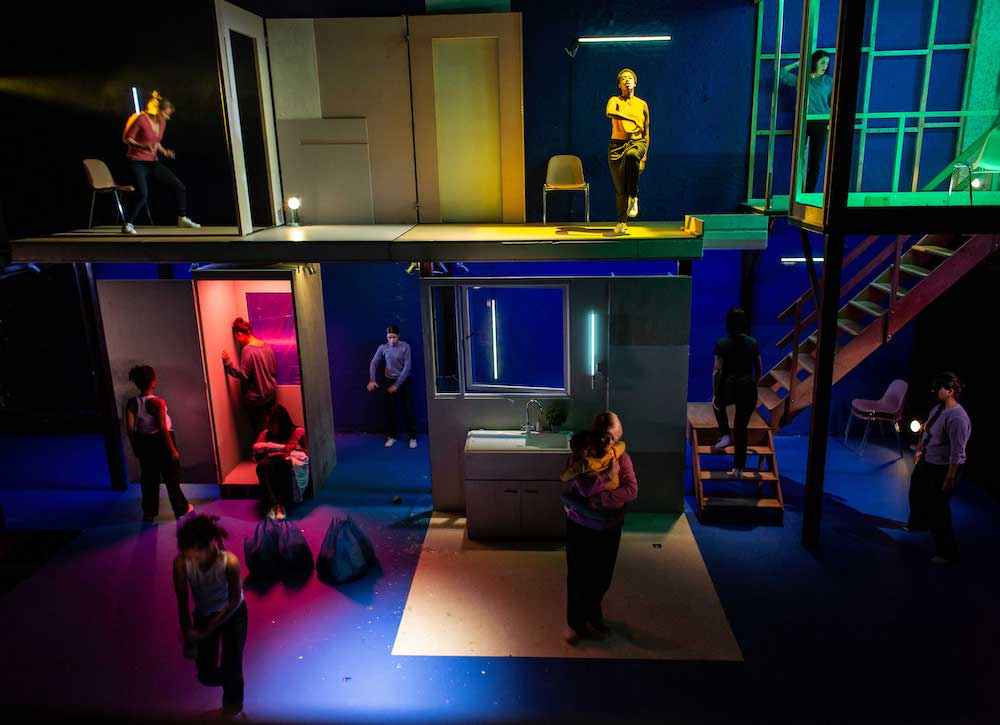[Blank], Donmar Warehouse review - strong but dispiriting | reviews, news & interviews
[Blank], Donmar Warehouse review - strong but dispiriting
[Blank], Donmar Warehouse review - strong but dispiriting
Alice Birch's new play prioritises form over content, and is depressingly reactionary

Clean Break, the theatre company that specialises in working with women in the criminal justice system, is doing a lot of celebrating. It's the 40th anniversary of this unique female organisation and already this year they have put on a variety of shows, from Chloe Moss's Sweatbox to the devised piece Inside Bitch.
The result is an impressionistic piece made up of fragments, like a untidy pile of shattered mirror shards, reflecting flashes of social reality. The short and sharp and often strong scenes come at you thick and fast: a mother and her daughter argue about the latter's new boyfriend; he turns out to be violent; she struggles to get herself and her kids into a shelter. Another mother is in conflict with her junkie daughter, who breaks into her house and demands money; when her mother refuses to help her, she becomes a sex worker on the street. Another mother tries to sing her child to sleep, borrowing awkwardly from Roberta Flack's "First Time Ever I Saw Your Face".
As the issues pile up - poor parenting, mental health problems and urban loneliness - the criminal justice system appears to be broken: even when it tries to help an imprisoned pregnant woman, by offering her a place in a mother and baby unit, it turns out that this is located a huge distance away from her children. In this dark vision of troubled women everyone is imprisoned, whether they are literally incarcerated or not. In a show in which some scenes are just seconds long, everywhere you look you see solitary women and lost children. A shadow of damage pervades the whole evening, with the threat of suicide ever present.
This experimental show is highly collaborative: Birch has written a 516-page playtext which is heavy enough to break your toe if you let it slip out of your hand. It comprises 100 scenes of various lengths, from snapshots to longer pieces, and was first performed as part of the National Theatre's annual Connections youth theatre fest in June 2018, when it had 60 short scenes. Now, director Maria Aberg and Birch have chosen to stage 27 scenarios, and Aberg works hard to give the show some coherence. She joins up some the fragments to create a better sense of a unity of experience. The longest scene, called "Dinner Party", lasts 40 minutes and switches focus to middle-class pretensions and white-collar crime: snorting cocaine.
 While several of the short scenes were either powerful or heartbreaking, I have to say that a lot of this just got on my nerves. A lot of the creative energy has gone into the experimental form of the play, leaving little thought for the content. There's no story here, no drama, no arc. No new insights; no fresh persepectives. It's also a bit rich for the playwright to attack middle-class professionals for being inauthentic and then burden her working-class characters with poetic speeches, metaphorical declamations and artificial verbal ticks. Such playwriting is self-conscious and unconvincing. And although the large cast is wonderfully diverse, the dialogues have no individual flavour: everyone speaks like everyone else.
While several of the short scenes were either powerful or heartbreaking, I have to say that a lot of this just got on my nerves. A lot of the creative energy has gone into the experimental form of the play, leaving little thought for the content. There's no story here, no drama, no arc. No new insights; no fresh persepectives. It's also a bit rich for the playwright to attack middle-class professionals for being inauthentic and then burden her working-class characters with poetic speeches, metaphorical declamations and artificial verbal ticks. Such playwriting is self-conscious and unconvincing. And although the large cast is wonderfully diverse, the dialogues have no individual flavour: everyone speaks like everyone else.
This kind of playwriting also lacks variety in its representation of women. All the characters have the same voice and the same identity: that of victimhood. Okay, some lament and some shout, but the message is the same. I know that some women really are victims, but to represent all women as equally victimised seems not only dispiriting, but also politically reactionary. The play endlessly repeats the mantra: woman hands down misery to woman, mothers fail their daughters who go on to fail their daughters too. It's a counsel of despair. That said, the cast are extraordinarily precise and taut in their acting.
Lasting almost two hours without a break, [Blank] has a huge set by designer Rosie Elnile (pictured above), which is a great backdrop, helped by lots of visual effects, to the performances: it's hard to single out individuals in what is essentially an ensemble piece, but I really liked Jackie Clune and Thusitha Jayasundera as exasperated mothers, Shona Babayemi as a truth-telling party guest, Zainab Hasan as an agonized addict and Kate O'Flynn as an angry daughter. But however powerful and committed the performances, the result is both depressing and politically questionable.
rating
Explore topics
Share this article
The future of Arts Journalism
You can stop theartsdesk.com closing!
We urgently need financing to survive. Our fundraising drive has thus far raised £49,000 but we need to reach £100,000 or we will be forced to close. Please contribute here: https://gofund.me/c3f6033d
And if you can forward this information to anyone who might assist, we’d be grateful.

Subscribe to theartsdesk.com
Thank you for continuing to read our work on theartsdesk.com. For unlimited access to every article in its entirety, including our archive of more than 15,000 pieces, we're asking for £5 per month or £40 per year. We feel it's a very good deal, and hope you do too.
To take a subscription now simply click here.
And if you're looking for that extra gift for a friend or family member, why not treat them to a theartsdesk.com gift subscription?
more Theatre
 The Assembled Parties, Hampstead review - a rarity, a well-made play delivered straight
Witty but poignant tribute to the strength of family ties as all around disintegrates
The Assembled Parties, Hampstead review - a rarity, a well-made play delivered straight
Witty but poignant tribute to the strength of family ties as all around disintegrates
 Mary Page Marlowe, Old Vic review - a starry portrait of a splintered life
Tracy Letts's Off Broadway play makes a shimmeringly powerful London debut
Mary Page Marlowe, Old Vic review - a starry portrait of a splintered life
Tracy Letts's Off Broadway play makes a shimmeringly powerful London debut
 Little Brother, Soho Theatre review - light, bright but emotionally true
This Verity Bargate Award-winning dramedy is entertaining as well as thought provoking
Little Brother, Soho Theatre review - light, bright but emotionally true
This Verity Bargate Award-winning dramedy is entertaining as well as thought provoking
 The Unbelievers, Royal Court Theatre - grimly compelling, powerfully performed
Nick Payne's new play is amongst his best
The Unbelievers, Royal Court Theatre - grimly compelling, powerfully performed
Nick Payne's new play is amongst his best
 The Maids, Donmar Warehouse review - vibrant cast lost in a spectacular-looking fever dream
Kip Williams revises Genet, with little gained in the update except eye-popping visuals
The Maids, Donmar Warehouse review - vibrant cast lost in a spectacular-looking fever dream
Kip Williams revises Genet, with little gained in the update except eye-popping visuals
 Ragdoll, Jermyn Street Theatre review - compelling and emotionally truthful
Katherine Moar returns with a Patty Hearst-inspired follow up to her debut hit 'Farm Hall'
Ragdoll, Jermyn Street Theatre review - compelling and emotionally truthful
Katherine Moar returns with a Patty Hearst-inspired follow up to her debut hit 'Farm Hall'
 Troilus and Cressida, Globe Theatre review - a 'problem play' with added problems
Raucous and carnivalesque, but also ugly and incomprehensible
Troilus and Cressida, Globe Theatre review - a 'problem play' with added problems
Raucous and carnivalesque, but also ugly and incomprehensible
 Clarkston, Trafalgar Theatre review - two lads on a road to nowhere
Netflix star, Joe Locke, is the selling point of a production that needs one
Clarkston, Trafalgar Theatre review - two lads on a road to nowhere
Netflix star, Joe Locke, is the selling point of a production that needs one
 Ghost Stories, Peacock Theatre review - spirited staging but short on scares
Impressive spectacle saves an ageing show in an unsuitable venue
Ghost Stories, Peacock Theatre review - spirited staging but short on scares
Impressive spectacle saves an ageing show in an unsuitable venue
 Hamlet, National Theatre review - turning tragedy to comedy is no joke
Hiran Abeyeskera’s childlike prince falls flat in a mixed production
Hamlet, National Theatre review - turning tragedy to comedy is no joke
Hiran Abeyeskera’s childlike prince falls flat in a mixed production
 Rohtko, Barbican review - postmodern meditation on fake and authentic art is less than the sum of its parts
Łukasz Twarkowski's production dazzles without illuminating
Rohtko, Barbican review - postmodern meditation on fake and authentic art is less than the sum of its parts
Łukasz Twarkowski's production dazzles without illuminating
 Lee, Park Theatre review - Lee Krasner looks back on her life as an artist
Informative and interesting, the play's format limits its potential
Lee, Park Theatre review - Lee Krasner looks back on her life as an artist
Informative and interesting, the play's format limits its potential

Add comment